“Life in a Tenement Square” By Flogging Molly
Well I kissed the day, I was on my way
From those cold gray blocks of stone
For seventeen years of squalor filled tears
A time now with innocence lost
As the sun split the room
With its rays filled with gloom
Turnin’ all hope to despair
And the only thing left
Was to flee from the nest
That was Life In A Tenement Square:
I remember the song where the rats sang along
And danced for their daily bread
While the damp washed the walls
That were twenty feet tall
Not a child in the house was fed
On the porter filled face
Of the men left a trace
Of the coin they had already spent
While our mothers asked God
What was Hell ever for
When you lived in a Tenement Square
Grab what’s left of the coal
From the ol’ cubbyhole
These cinders need more to be a fire
While the ghosts of the soldiers
That lived there before us
Laugh with their guns by their side
I hear them laugh, with their guns by their side
Now politicians they dwell
In that forgotten Hell
Our misery’s been turned into mews
Where the fat of the land
Now hog, hand-in-hand
A crime now of life was ever true
As the sun split the room
With its rays filled with gloom
Turnin’ all hope to despair
And the only thing left
Was to flee from the nest
That was Life In A Tenement Square…
(Lyrics retrieved from: http://www.azlyrics.com/lyrics/floggingmolly/lifeinatenementsquare.html).
“And our Mothers asked God/What was Hell ever for/When you lived in a tenement square[?]”
“We know that poverty is unpleasant; in fact, since it is so remote, we rather enjoy harrowing ourselves with the thought of its unpleasantness. But don’t expect us to do anything about it. We are sorry for you lower classes, just as we are sorry for a cat with the mange, but we will fight like devils against any improvement of your condition. We feel that you are much safer as you are. The present state of affairs suits us, and we are not going to take the risk of setting you free, even by an extra hour a day. So, dear brothers, since evidently you must sweat to pay for our trips to Italy, sweat and be damned to you.”[1]
George Orwell reflects the elite attitude towards the working class in his first hand account of poverty. Orwell’s cardinal sociological/journalistic work Down and out in Paris and London follows his experiences living as a tramp and vagrant among the working class people in two European nations. The attitude of bourgeoisie towards their underlings is further highlighted by Friedrich Engels in The Condition of the Working Class in England. “We have seen in the course of our report how the bourgeoisie exploits the proletariat in every conceivable way for its own benefit!”[2]
Engels focuses on particular regions and cities within the British Isles to illustrate the abject poverty, despair and squalor experienced by the working class. When writing of the Great Towns, Engels hones in on Lancashire. Indeed, Manchester and the surrounding cities are the epicenter of the Industrial Revolution. Thus the industrial impacts on the land, people, and cities are readily observed in this area.
Engels writes of the beauty of Lancashire that clashes with the industrial slum of the cities and towns, “Again we have beautiful country sloping gently from the watershed westwards towards the Irish Sea, with […] charming green valleys […].”[3] However; Engels continues, “The degradation to which the application of steam-power, machinery, and the division of labor reduce the working man” cannot be ignored.[4] The reduction of the working man is poignantly articulated through Engels in graphic descriptions of death, disease and malaise. Moreover, Engels describes the spatial setting of the working class in the context of their suffering.
There can be a tendency to believe that England is a bastion of civilization and high culture. British Imperialism was founded on notions of inherent superiority and enlightenment. However, by closely examining the cultural and spatial conditions of Britain’s working poor, it becomes clear that this bastion of civilization is a multilayered structure with an exploitation fueled ‘enlightenment.’
Image 1. By C. Smith in Lancashire 2005. The coal blackened stone of factories and mills can be seen on most buildings.
Image 2. By C. Smith in Lancashire 2005. Row housing allows for the working poor to live side by side.
Image 3. By C. Smith in Wigan, Lancashire 2005. A public square in Wigan.
Image 4. By C. Smith in Wigan, Lancashire 2005. A metal and stone fence protects an abandoned building from vagrants.
Image 5. By C. Smith in Lancashire 2005. A farmer’s field is surrounded by trees and glens.
Image 6. By C. Smith in Lancashire 2005. The green valleys that Engels referenced are clear on this view from a hike to Rivington Pike.
Image 7. By C. Smith in Lancashire 2005. The green of Lancashire.
Image 8. By C. Smith in Lancashire 2005. Rivington Pike, a former watch tower used to spot the Spanish Armada sits atop a hill that can see the entire expanse of Lancashire.
Image 9. By C. Smith in Lancashire 2005. Rivington Pike, a stark contrast between the deep history of Lancashire, the greenery and the nearby industrialized cities and towns.
“The tendency of mechanical progress, then, is to frustrate the human need for effort and creation. It makes unnecessary and even impossible the activities of the eye and the hand.”[5] George Orwell.
[1] Orwell, Down and out, 119.
[2] Engels, The Condition, 286.
[3] Engels, The Condition, 54.
[4] Engels, The Condition, 54.
[5] Orwell, The Road to Wigan Pier, 186.
References
Engels, Friedrich. The Condition of the Working Class in England. Stanford, Calif.: Stanford University Press, 1968.
Orwell, George. The Road to Wigan Pier. New York: Harcourt, Brace, 1958.
Orwell, George. Down and out in Paris and London: A Novel. New York: Harcourt Brace Jovanovich, 1961.
****Note: Formatting is somewhat incorrect as I could not make the block citation appear correctly.

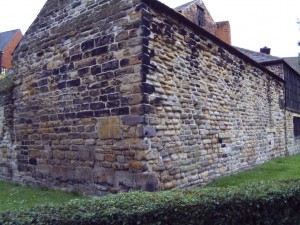
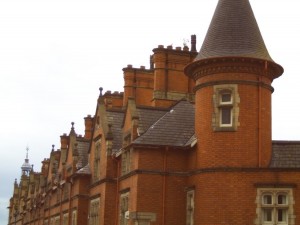
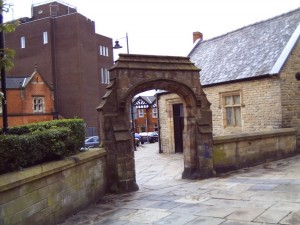
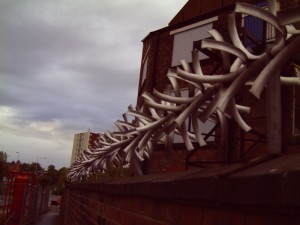
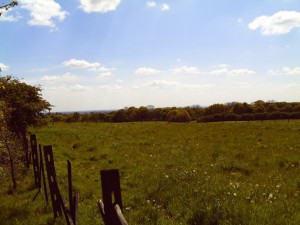
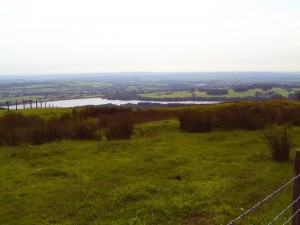
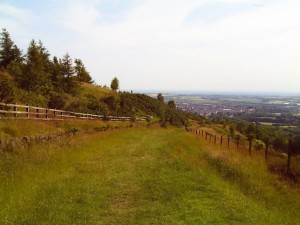
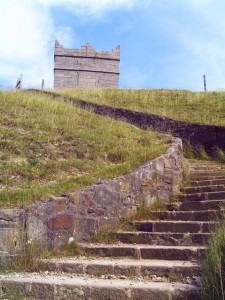
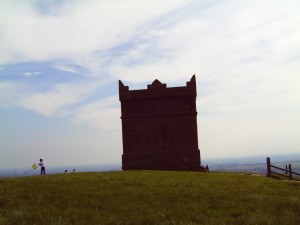
The author of the blog rendered a good account of Engels and Orwell’s reflection on the living conditions of the poor in England.
Her writing respect the dry and disengage tone the author adopt when describing the overwhelming poverty of the time. Miss Smith was able to remain objective in her account while hinting the reader toward her real feeling regarding the conditions of the disfavored people.
The blog’s introduction song “Life in the Tenement Square” give the reader another perspective on the conditions of the working class. It offer a new reflection on the question made by the inhabitant the slums. The Irish tone of the song remind the readers of Orwell and Engels of the harsh life and flagrant racism the Irish people were victims of.
A very well written blog with the pictures and song helping to emphasize the style and emotions that influenced the design and purpose of these buildings and infrastructures.